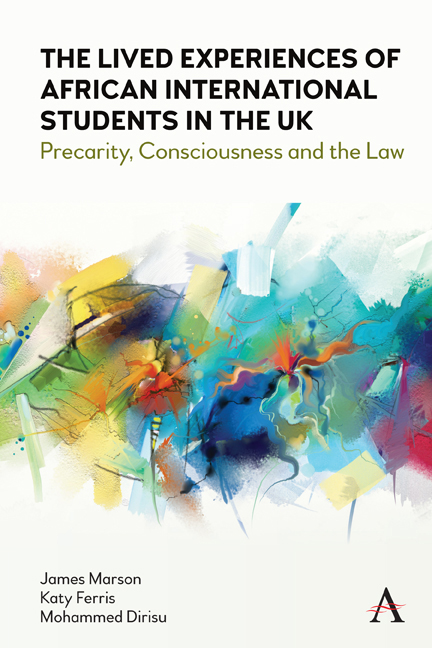 The Lived Experiences of African International Students in the UK
The Lived Experiences of African International Students in the UK Book contents
- Frontmatter
- Contents
- Preface
- Acknowledgements
- Legislation
- Case Law
- 1 Introduction
- 2 Methodology
- 3 Student Migration and Global Inequality
- 4 Migration as a Socio-Legal Phenomenon
- 5 The ‘Student-Migrant-Worker’ Meets ‘Precarity’
- 6 The ‘Utterly Transactional Worker’
- 7 Semi-Legal Working?
- 8 Conclusions
- Bibliography
- Index
1 - Introduction
Published online by Cambridge University Press: 13 September 2022
- Frontmatter
- Contents
- Preface
- Acknowledgements
- Legislation
- Case Law
- 1 Introduction
- 2 Methodology
- 3 Student Migration and Global Inequality
- 4 Migration as a Socio-Legal Phenomenon
- 5 The ‘Student-Migrant-Worker’ Meets ‘Precarity’
- 6 The ‘Utterly Transactional Worker’
- 7 Semi-Legal Working?
- 8 Conclusions
- Bibliography
- Index
Summary
Undertaking study abroad is an important and often exhilarating experience, and certainly one to which prospective international students often look forward to. For some, the outlook is one of heightened excitement for the possibilities that lay await, yet for others, this excitement is tempered by anxieties regarding the associated financial expenses and how these are to be costed. This study centres on the experiences of the ‘others’ aforementioned, and from one of the poorer regions which sends relatively high numbers of students to institutions in the United Kingdom (UK). These international students of sub-Saharan African descent, and who undertake temporary employment while in full-time education to mitigate against the worst effects of the financial burden international study can impose, are the focus of the empirical and ethnographic evidence presented in this study. Studies from academics including Forbes-Mewett et al. (2009) have revealed many international students experience financial difficulties while studying abroad, and students from financially impoverished states are more given to these anxieties. A corollary matter, and central to this study's undertaking, is that international students are officially designated migrants and therefore subject to a suite of migration control in the UK, albeit of a different cadre. This is both a legal and sociopolitically charged designation and noteworthy particularly as it impacts on the students’ employment experiences in the UK.
It is generally acknowledged that allowing international students access to temporary/part-time employment while studying can be beneficial for their personal and professional development, and indeed their overall experience in the host country (Creed et al. 2015; Park and Sprung 2013; Sanchez-Gelabert et al. 2017). In return, these students can provide a pool of nascent, contingent labour, capable of being engaged to fill employment shortages within local industries and at relatively low costs (Hawthorne 2010; Khadria 2009; Ziguras and Law 2006). However, as subjects of migration controls, legal conditions apply to their employment and the rights therein which affect approximately half a million international students that enter UK Higher Education Institutions (HEIs) every other academic year (Higher Education Statistics Agency 2016). These students (previously) entered the UK on a Tier 4 (study) visa which generally restrict them to a maximum of 20 hours of employment per week during term-time, and also proscribed their taking of work autonomously as independent contractors or on a self-employed basis.
- Type
- Chapter
- Information
- The Lived Experiences of African International Students in the UKPrecarity, Consciousness and the Law, pp. 1 - 10Publisher: Anthem PressPrint publication year: 2022


